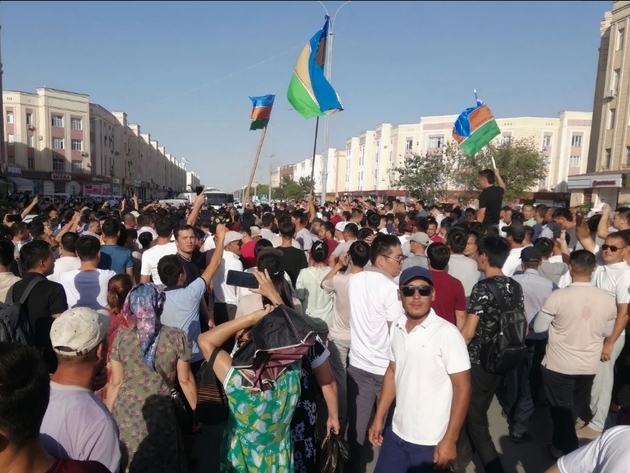For the past two days, the world has been closely following the outbreak and development of the Karakalpak uprising in Uzbekistan. It is worth noting that we will not discuss it in detail here (that will come towards the end), but rather the analogies that come to mind in relation to it.
Karakalpakstan is one of the autonomous republics created within the Soviet Union, the question of which arose after its dissolution. In 1993, it declared itself part of Uzbekistan as a sovereign republic with its own constitution, government, and parliament. It even had the constitutional right to secede from Uzbekistan. This is the first shock, because the former autonomous republic was able to achieve a higher status than the former autonomous republics of the RSFSR under the “democrat Yeltsin”.
Even Tatarstan, which signed a separate agreement with the Russian Federation in 1994, was not granted the right to secede. And now President Shavkat Mirziyoyev has proposed to change the constitution of Uzbekistan, according to which the new version would still contain provisions about Karakalpakstan as a separate republic, but the provisions stating that it is a sovereign republic with the right to secede from Uzbekistan would disappear. And the Karakalpaks took to the streets en masse, and after violence was used against them, the demonstrations essentially turned into an uprising.
In the end, despite the use of force to suppress the uprising, Mirziyoyev declared that Karakalpakstan must fully maintain its status and that no changes will be made to restrict its rights. And this is another shock. The Yeltsin era was a time of relative freedom for most Russian republics, with the exception of Chechnya, which refused to be part of it and faced Russian military action as a result. But compared to the current period, it was also a time of freedom for the rest of Russia.
On the contrary, when Yeltsin handed over power in Russia to Putin, Karimov had already established a harsh dictatorship in Uzbekistan. In other words, when Putin came to power in Russia, Russian society and its republics were already accustomed to a certain degree of freedom. But this did not help them to preserve it, because when Putin began to take away these freedoms one by one, the Russian society, which was used to freedom, and the Russian republics in particular, unquestioningly surrendered their rights to him.
As a result, today in Russia, which is a federation only in words, the republics have the same status that Karakalpakstan would have had according to the proposed amendments – they have the name, but not the sovereignty. Not to mention the right to secede, which Russia never had even in the best of times.
In this situation, however, the Karakalpaks rose up as one, even after decades of Karimov’s dictatorship, which failed to crush them. And the peoples of the Russian republics allowed the Kremlin to introduce all kinds of amendments to both the Russian and their own constitutions, which reduced their rights. So now the only remaining step is to completely abolish these national republics and turn them into Russian territories.
And here is another shock: in this situation the authorities in Uzbekistan, who are accustomed to harsh rule and have the experience of suppressing the Andijan uprising, refuse to give up their amendments and leave the Karakalpaks their status and the right to secession. But what would happen in Russia in such a situation? Would Putin recognize the right of a rebellious republic to secede from the Russian Federation?
Drawing analogies between these situations, one can understand the humiliated and crushed state in which the citizens and peoples of Russia exist today. And how degraded Russia itself has become, which not long ago was perceived as “almost a democracy” compared to the “Central Asian dictators”, but now has been left behind in terms of its level of development, most of which are moving in the opposite direction.
As for the events themselves between Karakalpakstan and Uzbekistan, we are following them closely and studying various assessments in order to form a well-founded opinion on what is happening. Until then, we do not want to take sides in this intra-Muslim confrontation, especially considering that the Karakalpaks and Uzbeks are not only religious brothers, but also linguistic relatives, Turkic people.
In this situation, we would like to urge all parties to refrain from spilling brotherly blood and to strive for a solution to the conflict based on justice and granting each party its rights. May Allah protect the Muslims of Karakalpakstan and Uzbekistan, guide their leaders and peoples, and grant prosperity to their countries.

